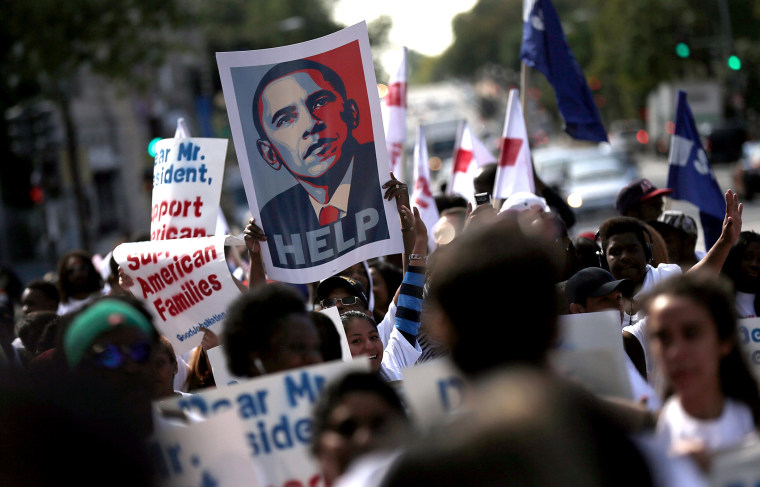On Tuesday morning, for the ninth time in less than a year and half, low-wage employees working for federal contractors are going on strike.
Organizers say that more than 200 workers are expected to walk off the job at 9 a.m., including workers at the Ronald Reagan Building, the Pentagon, the Air and Space Museum, and the National Zoo. These workers, who will be joined in a solidarity rally by members of the Congressional Progressive Caucus and an interfaith group of clergy members, are demanding that President Obama take executive action to improve working conditions at companies that hold contracts with the federal government.
"I'm going on strike [Tuesday] to get a good jobs executive order signed," said Keyona Dandridge, who works at the sandwich shop Potbelly's in Union Station. Because Union Station is a federally owned building, her Potbelly's outlet has a contract with the federal government, giving the Obama administration broad latitude to require a certain level of pay and other benefits.
"The biggest surges in union growth happen after worker uprisings trigger presidential intervention."'
In fact, the White House has already taken a step in that direction. In February, the president signed an executive order requiring federal contractors to pay their employees at least $10.10 per hour. By June, when the Labor Department released further details on the implementation of that order, Good Jobs Nation -- the organizing group which represents federally contracted workers -- had already decided that $10.10 wasn't enough.
Dandridge, who currently makes the D.C. minimum wage of $9.50 per hour, said the president's February executive order was "a good start, but it wouldn't be enough." Although she makes close to the wage she will be earning once the executive order goes into effect, she still finds it difficult to make ends meet.
She currently splits household expenses with her mother, but still carries the financial burden of raising her 11-month-old son. She says household expenses and low wages have kept her from getting formal education and advancing up the career ladder.
"I want to go back to school to become a registered nurse," she said. "I completed one year, but I couldn't afford books and tuition, so I had to drop out."
In 2013, the left-leaning think tank Demos estimated that the federal government directly or indirectly subsidizes nearly 2 million jobs where employees earn less than $12 per hour. In a more recent report, Demos researchers proposed a series of possible remedies, including executive action to encourage collective bargaining at companies with federal contracts, and to ban companies found guilty of wage theft from obtaining such contracts. Organizers say they simply want companies with federal contracts to more closely resemble Costco, a company Obama has repeatedly praised for its relatively high wages and decent working conditions. The entry-level salary for a Costco employee is $11.50 per hour.
The Congressional Progressive Caucus has repeatedly endorsed these aims, and members of the caucus have marched with Good Jobs Nation strikers on multiple occasions. Last week, the caucus's two co-chairs -- Rep. Keith Ellison, D-Minn., and Rep. Raul Grijalva, D-Ariz. -- wrote a letter to Obama requesting that he sign an executive order that would "[p]rovide a preference in contracting decisions for employers that pay a living wage and a full benefits package."
This proposed executive order would also give preference to employers "that respect the right of their workers to collectively bargain for fair wages." Ellison has also introduced amendments to multiple appropriations bills that would prevent companies guilty of wage theft from receiving federal contracts.
While Good Jobs Nation is focused on lifting standards in a particular sector of the economy, there's a broader strategy behind it. The federally contracted workers' campaign is a project of the labor coalition Change to Win (CtW), which hopes to use Good Jobs Nation as a lever to alter the low-wage economy as a whole. At a Netroots Nation panel earlier this month, CtW deputy director Joe Geevarghese explained that wage increases for federal contractors are supposed to put upward pressure on other sectors of the low-wage economy.
"The biggest surges in union growth happen after worker uprisings trigger presidential intervention," he said.
